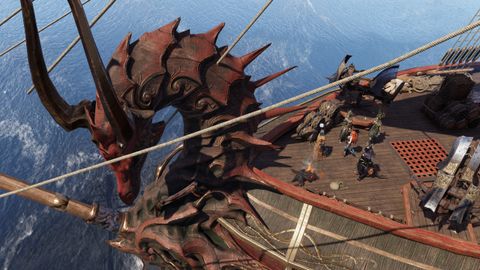Our Verdict
Divinity: Original Sin 2 is a sprawling, inventive adventure and one of the best RPGs ever made.
PC Gamer's got your back
What is it? A huge, liberating RPG to play with friends or on your lonesome.
Reviewed on: Intel i5-3570K @3.40 GHz, 8 GB of RAM, GeForce GTX 970, Windows 10
Price: $45/£30
Release date: Out now
Developer: Larian Studios
Publisher: Larian Studios
Link: Official site
Buy it: GOG, Steam
Read our affiliate policy.
Playing Divinity: Original Sin 2 is uncannily like playing a tabletop RPG. The way that Larian’s sequel embraces player creativity immediately conjures up memories of days spent sitting around a table, asking the Dungeon Master if I can attempt the last stupid idea that floated into my head. And like a good DM, Original Sin 2 usually answers that question with “Yes, you can attempt it.”
My plans don’t always succeed, of course, but embarrassing failures, like the time I froze my entire party during a fight with some demons, can be just as entertaining. That freedom to experiment and to make mistakes is present right from the get-go, when you make your would-be hero. Or villain.
You can play everything from an undead Dwarf who loves nothing more than swinging his two-handed axe and throwing rocks to a sneaky Elven wizard who can talk to animals and get visions by chowing on corpses. There are pre-made classes and characters with rich backgrounds and personal quests, but it’s also possible to create something that’s entirely your own, constructing a persona and custom class out of a series of origin tags, attributes and skills.
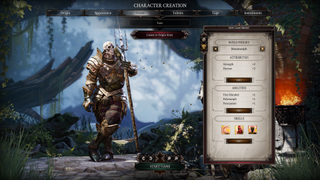
I do recommend picking a pre-made origin character, though. You can still customise their appearance and skills, but it’s their quests that are important. Each is blessed with a long mission that runs parallel to the main quest, fleshing it out and making the stakes all the more personal. They also tend to get the best lines, especially the undead Eternal, Fane, whose biting sarcasm keeps me warm at night. The origin characters you don’t pick, however, become companions that you can recruit, letting you still experience their stories.
With so many different potential paths, it’s handy to have a party that covers all the bases. Conveniently, companions—you can bring three along with you—can be customised the moment you meet them, and any mistakes made can be undone by respeccing via a mirror you’ll get access to around 15 to 20 hours in. Given the broad range of skills and multitude of opportunities to mess up, it’s a major boon.
When there are limitations, they’re always hidden well, and Larian has done a phenomenal job at anticipating what players might want to do, even how they might try to break the game. Take the teleport skill. You can get your hands on this early on, and it essentially provides a shortcut through a lot of obstacles and quests. It almost feels like cheating, using it, but not only does Original Sin 2 support it, it offers up the idea in the first place.
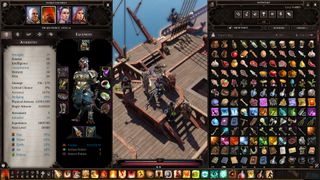
As she gushed about her son, it dawned on me, I knew this guy... I'd killed him.
These neat tricks don’t mean the quests are simple. Larian loves its headscratchers, populating Rivellon with riddles, moral conundrums and ancient mysteries. They’re great, fat with unexpected turns and rewarding character moments, but keeping track of them is hard work. The journal quickly becomes impossible to parse, and directions from NPCs can be vague, but it’s another otherwise welcome feature that really complicates things: the connected nature of the world.
Many of the NPCs you’ll meet have relationships and allegiances that affect more than one quest, and seemingly unrelated events can collide, cutting adventures short. These ripples of consequence result in a world that feels alive, and even give NPCs agency, but they also inspire hesitation when decisiveness is required out of the fear that one or more of these choices will kill another quest. It’s daunting, but it’s also a fair price to pay for the weight it gives to decisions.
One of the first places I hit up in any new RPG village is the local watering hole, so when I arrived in Driftwood during the game’s third chapter, I immediately headed to the Black Bull. Its owner was an affable, chatty woman and proud mother. As she gushed about her son, it dawned on me, I knew this guy. He was a monster of a man I’d met hours ago. I’d killed him. And there was his mother, boasting about how good he is, how clever he is, and how much she loves him. I never told her, though I could have, and nothing came of the conversation, but it did matter, making the fight retroactively more memorable. And there are more of these moments than I could reasonably count.
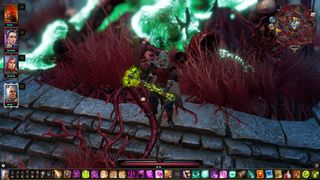
Companions not only assist you while undertaking their own personal quests, they are ultimately your competition.
Original Sin 2’s main quest calls to mind Baldur’s Gate II: Throne of Bhaal, both being races to godhood. The world’s a mess, you see, with monstrous beasties rampaging wherever there’s source magic. And you just so happen you be a sourcerer with a divine calling, born with the ability to wield this powerful magic, talk to the dead and feast on souls. So of course you’ve been hauled off to jail by the corrupt Magisters—the game’s fanatical villains—ostensibly to stop you from ruining the world. What starts off as mission to escape prison spirals into an quest involving gods competing for survival and an evil poised to swallow up the world.
What could have been your typical, high-stakes fantasy quest is elevated by strong writing and voice acting that effortlessly jumps between whimsical and brutally grim. It can be surprisingly touching, too. As tempting as it can be to play the evil arsehole in a game that offers this much freedom, there are a lot of heartfelt moments that you’ll only see if you’re not an arse. That’s why I keep Lohse around. Out of my three companions, she’s the good cop, talking to people like a thoughtful human being instead of an evil undead necromancer.
Larian has also subverted the party dynamic quite a bit. Companions not only assist you while undertaking their own personal quests, they are ultimately your competition, each the chosen hero for their respective divine sponsor. This has an even greater impact in co-op, with each player capable of screwing over their three allies. While you’re shopping or fighting, they might be growing in power, waiting to betray you.
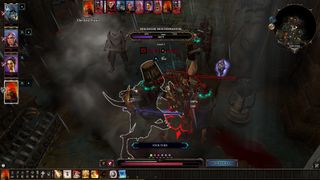
The tools are simple enough to use, but flexible enough so that you can create brief 20 minute campaigns or massive roleplaying romps that will take your group days to finish.
In my own co-op campaign, I’ve been mostly content with blowing everything up. Literally and figuratively. My pal wants to chat to an NPC? I throw a massive boulder at them. He wants to avoid what will clearly be a fatal fight with some teleporting crocodiles? I run up to them and set them on fire. Obviously you should never play with me, but I’m having a blast.
Beyond the co-op, there’s a Game Master mode, letting you use the game’s assets (or your own) to craft tabletop-style adventures. The tools are simple enough to use, but flexible enough so that you can create brief 20 minute campaigns or massive roleplaying romps that will take your group days to finish. Unfortunately I’m still yet to make something as impressive as Larian CEO Swen Vincke’s recreation of the start of UItima 7.
When you want to blow off some steam, there’s also the Arena mode, pitting players against each other in structured PvP. What might have been a simple diversion is instead a really great reason to keep playing once you’re finished the campaign. The deep and often chaotic tactical combat is a high point, and the opportunity to get into more scraps is very welcome.
Rivellon is a violent world, and while many of the turn-based fights can be avoided, you’re still going to spend a lot of time brawling. These battles consistently take place in tactically interesting places, filled with choke points, explosive barrels and multiple levels, which is especially impressive considering you can start a fight with any NPC. But like the rest of the game, it’s the vast number of choices you can make in each encounter that make them so compelling.

A classless system means that you can create a mind-boggling array of weird heroes, from warriors who can sprout wings, horns and spider legs, to preternaturally gifted archers who can command the weather. Some skills confer flight. Others make enemies bleed fire. Battlefields are really laboratories primed for madcap experiments, where magical and martial skills can be combined with the environment to create anything from a wall of fire that heals to demonic imps made out of pools of blood.
You can lose yourself in these burning, bloodsoaked arenas.
They’re tough, though. Fights are brutal and the broad range of skills makes it hard to create plans until after you’ve already lost once. They’re puzzles that you need to keep working at, attempting to come at them from different angles, learning enemy patterns, pinpointing the major threats. You can lose yourself in these burning, bloodsoaked arenas. It’s easily one of the best RPG combat systems, but there’s no denying that it requires more patience and practice than most.
That’s true of the game in general. Its scope can be intimidating, but not overwhelming, and there’s usually a way to fix a mistake. If you murder someone you need to talk to for a quest, for instance, there’s a good chance that looting their corpse will send you in the right direction. So it can be punishing, certainly, but never cruel.
And it’s that intimidating, ambitious scope, that dedication to player freedom, that makes Divinity: Original Sin 2 so impressive. There isn’t another RPG that lets you do so much. Larian promised a lot, and it has absolutely followed through, crafting a singular game that juggles a bounty of complex, immersive systems, and never drops them.
Divinity: Original Sin 2 is a sprawling, inventive adventure and one of the best RPGs ever made.

Fraser is the UK online editor and has actually met The Internet in person. With over a decade of experience, he's been around the block a few times, serving as a freelancer, news editor and prolific reviewer. Strategy games have been a 30-year-long obsession, from tiny RTSs to sprawling political sims, and he never turns down the chance to rave about Total War or Crusader Kings. He's also been known to set up shop in the latest MMO and likes to wind down with an endlessly deep, systemic RPG. These days, when he's not editing, he can usually be found writing features that are 1,000 words too long or talking about his dog.

Divinity: Original Sin 2 isn't that much harder than Baldur's Gate 3, but Larian sure got better at constructing a first act between games

Larian CEO and founder Swen Vincke thinks he's cracked the first act of his next game, but 'it's not what you think and this is not an teaser for an announcement'
